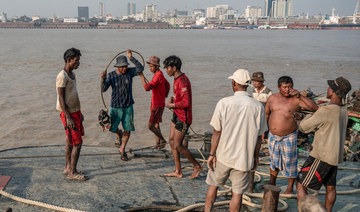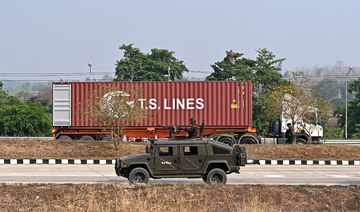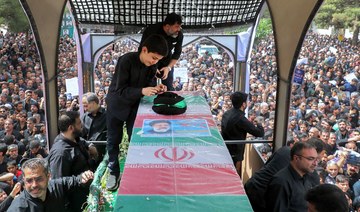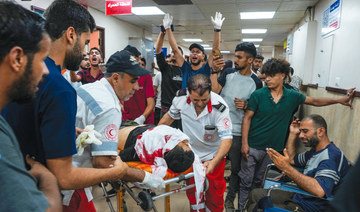BANGKOK: Six months into an offensive against Myanmar ‘s military government, opposition forces have made massive gains, but civilian casualties are rising sharply as regime troops increasingly turn toward scorched-earth tactics in the Southeast Asian country’s bitter civil war.
There is pressure on all fronts from powerful militias drawn from Myanmar’s ethnic minority groups and newer resistance forces. Troops are retaliating with air, naval and artillery strikes on hospitals and other facilities where the opposition could be sheltered or aided.
“When the mass of people rise up against them, I think it terrifies them,” said Dave Eubank, a former US Special Forces soldier who founded the Free Burma Rangers, a humanitarian aid organization that has provided assistance to both combatants and civilians in Myanmar since the 1990s.
“They know that hospitals, churches, schools and monasteries are important places for human care, and gathering, and symbols — and they hammer them,” said Eubank. “That’s new.”
Military forces now control less than half the country, but are holding on tenaciously to much of central Myanmar including the capital, Naypyidaw — recently targeted by drone attacks — and largest city, Yangon, and is far better armed than the resistance forces, with support from Russia and China.
“People have been saying that the regime was on the brink of collapse since two weeks after the coup,” in February 2021, said Morgan Michaels, an analyst with the International Institute of Strategic Studies who runs its Myanmar Conflict Map project.
“On the other hand, obviously the regime is weaker than it’s ever been.... so there’s no doubt that it’s in serious, serious trouble,” he said.
Thet Swe, a spokesman for the military government, denied that troops were targeting buildings and areas where civilians were sheltering, blaming their destruction instead on the opposition forces, without citing evidence.
“The military never harmed hospitals, churches and civilians in our country,” he told The Associated Press in an email. “They did not use that strategy and are fighting the rebels only for the sovereignty of our country.”
As the fighting has moved into more populated areas, about 1 million people have been forced to flee their homes since the start of the offensive in October, contributing to the more than 3 million internally displaced people in the country of some 56 million, according to the UN’s humanitarian aid agency.
With the collapse of its health care system and food supplies dwindling, 18.6 million people are in need, up 1 million from a year ago, including 6 million children, the agency said.
How it began
Opposition in Myanmar, also known as Burma, had been growing since the army seized power from the elected government of Aung San Suu Kyi in February 2021, but it gained new momentum in October when major militias known collectively as the Three Brotherhood Alliance launched a joint offensive.
Together, the Arakan Army, the Myanmar National Democratic Alliance Army and the Ta’ang National Liberation Army — among the most powerful militias formed by Myanmar’s ethnic minorities — made quick advances.
As they captured huge swaths of territory largely in the north and northeast, including economically important border crossings with China and several major military bases, other ethnic armed groups sensed momentum and joined the fighting.
At the same time, People’s Defense Forces — armed resistance groups that support the shadow National Unity Government, which views itself as Myanmar’s legitimate administration — have been increasing in number and launching their own attacks, often supported and trained by the ethnic armed militias.
Both sides claim they have inflicted heavy tolls. And the military government under Senior Gen. Min Aung Hlaing has acknowledged it is under pressure, recently reintroducing conscription to increase its ranks.
That has pushed some young people into the resistance. Many more have fled to rural areas or neighboring countries to avoid fighting.
With the violence across its border, China helped broker a ceasefire in Myanmar’s north in January with the Three Brotherhood Alliance. But the alliance’s Arakan Army continues to fight in its home Rakhine state in the west and has made significant gains, while PDFs and other ethnic armed groups continue their own attacks elsewhere.
The latest fighting
The fiercest fighting in recent weeks has been in the southeast, where the main ethnic Karen fighting force, the Karen National Liberation Army, claimed in early April to have seized all the military bases in Myawaddy, the main town on the border with Thailand in Kayin state, also known as Karen state.
One army battalion clung to a position beside one of Myawaddy’s two bridges, assisted by the Border Guard Force, a rival Karen group that had been in charge of border area security for years, conducting lucrative business by providing protection to area casino resorts with links to organized crime.
The force, which declared itself neutral in January, now controls the town with military government administrators still in place, highlighting how some militia groups still prioritize their own interests.
“This is not a black and white situation. This is not the regime reconquering and reconsolidating control,” Michaels said of the fighting in the area. “This is the regime hanging on, keeping a foothold by the razor’s edge.”
Meanwhile, the military has pushed KNLA and People’s Defense Forces out of Kawkareik, a strategically important town along the road that connects Myawaddy with the rest of the country.
Thousands of civilians have fled Myawaddy and Kawkareik. But many civilians haven’t managed to escape.
At least 1,015 civilian deaths have been documented from Nov. 1 through May 1, according to the Assistance Association for Political Prisoners, a watchdog group that tracks political arrests, attacks and casualties. It says 4,962 civilians have been killed overall since the military took power three years ago.
The watchdog blamed the deaths on the military’s increasing use of scorched-earth tactics and fighting moving into more populated areas.
“The military has increasingly lost areas of control in recent months, which has only increased their use of this strategy, responding with airstrikes, shelling and so on in civilian areas,” the AAPP said in an email.
The group added that the number of civilian deaths in the recent months of fighting is likely double what it reported, if not more, but that it can’t document the numbers due to the intensification of the conflict.
Kyaw Zaw, a spokesperson for the shadow National Unity Government, said the military had destroyed 343 hospitals and clinics since it took power, and that those attacks had accelerated in the last two months, though he didn’t have specific details.
Eubank, with the Free Burma Rangers, said he and his teams operating near the front lines have witnessed the military, known as the Tatmadaw, fighting with a ” speed and force and a viciousness that we’ve never seen.”
But in fighting a common enemy, the resistance is showing growing unity, he said.
“The Burma army is still stronger than any of these resistance groups, and if they want to bring a division or two to bear, they will win the battle, but they’re not stronger than everybody else together,” he said.
What comes next
Whether that unity will continue if the regime falls, and if the disparate resistance forces can agree on a common path ahead for Myanmar, is an open question, Michaels said.
“On one hand, Myanmar is not Syria — there is common cause in fighting the regime,” Michaels said. “But at the same time, as the regime has receded from some areas, there are at least indicators of potential future conflicts between groups.”
He noted an incident in northern Shan state last month in which troops from two members of the Three Brotherhood Alliance — the Myanmar National Democratic Alliance Army and the Ta’ang National Liberation Army — traded fire over a territorial dispute. One person was injured.
The groups quickly agreed to stand down, but the incident illustrates that territorial tension is real, Michaels said.
An opposition politician still inside the country, speaking on condition of anonymity for his own safety, said Myanmar’s people have a common desire for peace and stability, but the various factions still pursue their own interests.
“It is hard to predict what is ahead, and they still don’t have a single political direction or goal. I think there is quite a problem in this situation,” he said.
“Myanmar is now at a crossroads.”
Civilian casualties rise in Myanmar’s civil war as resistance forces tighten noose around military
https://arab.news/8m8as
Civilian casualties rise in Myanmar’s civil war as resistance forces tighten noose around military
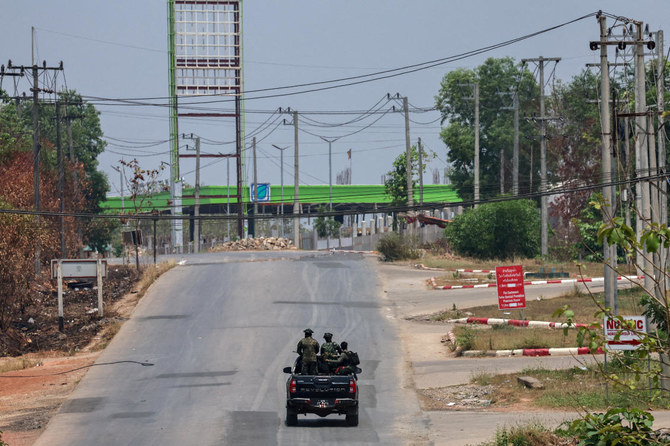
- An estimated one-third of those displaced are children, according to the UN statement
US authorities arrest man allegedly running ‘likely world’s largest ever’ cybercrime botnet

- Yunhe Wang was arrested on May 24 in Singapore, and authorities also seized $29 million in cryptocurrency: FBI
- Wang is accused of selling access to the 19 million Windows computers he hijacked to criminals
WASHINGTON: An international law enforcement team has arrested a Chinese national and disrupted a major botnet that officials said he ran for nearly a decade, amassing at least $99 million in profits by reselling access to criminals who used it for identity theft, child exploitation, and financial fraud, including pandemic relief scams.
The US Department of Justice quoted FBI Director Christopher Wray as saying Wednesday that the “911 S5” botnet — a network of malware-infected computers in nearly 200 countries — was likely the world’s largest.
Justice said in a news release that Yunhe Wang, 35, was arrested May 24. Wang was arrested in Singapore, and search warrants were executed there and in Thailand, the FBI’s deputy assistant director for cyber operations, Brett Leatherman, said in a LinkedIn post. Authorities also seized $29 million in cryptocurrency, Leatherman said.
Cybercriminals used Wang’s network of zombie residential computers to steal “billions of dollars from financial institutions, credit card issuers and accountholders, and federal lending programs since 2014,” according to an indictment filed in Texas’ eastern district.
The administrator, Wang, sold access to the 19 million Windows computers he hijacked — more than 613,000 in the United States — to criminals who “used that access to commit a staggering array of crimes that victimized children, threatened people’s safety and defrauded financial institutions and federal lending programs,” US Attorney General Merrick Garland said in announcing the takedown.
He said criminals who purchased access to the zombie network from Wang were responsible for more than $5.9 billion in estimated losses due to fraud against relief programs. Officials estimated 560,000 fraudulent unemployment insurance claims originated from compromised IP addresses.
Wang allegedly managed the botnet through 150 dedicated servers, half of them leased from US-based online service providers.
The indictment says Wang used his illicit gains to purchase 21 properties in the United States, China, Singapore, Thailand, the United Arab Emirates and St. Kitts and Nevis, where it said he obtained citizenship through investment.
In its news release, the Justice Department thanked police and other authorities in Singapore and Thailand for their assistance.
US to boycott UN tribute to Iran leader killed in helicopter crash

- The UN General Assembly traditionally meets to pay tribute to any world leader who was a sitting head of state at the time of their death
- US President Joe Biden’s administration was strongly criticized by some Republican members of Congress for offering condolences to Iran
UNITED NATIONS: The United States will boycott a United Nations tribute on Thursday to Iranian President Ebrahim Raisi, who was killed earlier this month in a helicopter crash, a US official said.
The 193-member UN General Assembly traditionally meets to pay tribute to any world leader who was a sitting head of state at the time of their death. The tribute will feature speeches about Raisi.
“We won’t attend this event in any capacity,” a US official, speaking on condition of anonymity, told Reuters. The US boycott has not previously been reported.
Iran’s mission to the United Nations in New York declined to comment.
Raisi, a hard-liner who had been seen as a potential successor to Supreme Leader Ayatollah Ali Khamenei, was killed when his helicopter came down in poor weather in mountains near the Azerbaijan border on May 19.
“The United Nations should be standing with the people of Iran, not memorializing their decades-long oppressor,” said the US official. “Raisi was involved in numerous, horrific human rights abuses, including the extrajudicial killings of thousands of political prisoners in 1988.”
“Some of the worst human rights abuses on record, especially against the women and girls of Iran, took place during his tenure,” the official said.
The UN Security Council stood at the beginning of an unrelated meeting for a moment of silence on May 20 to remember the victims of the helicopter crash. Deputy US Ambassador to the UN Robert Wood reluctantly stood with his 14 counterparts.
The United States expressed its “official condolences” for Raisi’s death, the State Department said on May 20. White House national security spokesperson John Kirby also said that day: “No question this was a man who had a lot of blood on his hands.”
US President Joe Biden’s administration was strongly criticized by some Republican members of Congress for offering condolences to Iran.
Raisi, 63, was elected president in 2021 and in office ordered a tightening of morality laws, oversaw a bloody crackdown on anti-government protests and pushed hard in nuclear talks with world powers.
UK parliament dissolves ahead of election

- Five weeks of campaigning officially began as 650 seats of MPs became vacant at 2301 GMT
- Prime Minister Sunak set the election for July 4, instead of later in the year as had been widely expected
LONDON: The British parliament dissolved on Thursday ahead of a July 4 general election, which looks set to bring Labour to power after 14 years of Conservative rule.
Five weeks of campaigning officially began as 650 seats of members of parliament (MPs) became vacant at one minute past midnight (2301 GMT) in line with the electoral schedule.
The first week of campaigning has seen a shaky start following Prime Minister Rishi Sunak’s rain-drenched election announcement, with many observers taking the downpour as a bad omen.
Sunak set the election for July 4, instead of later in the year as had been widely expected, in what observers said was an attempt to regain momentum as his party slides in opinion polls.
After 14 years in opposition, the Labour party now has the chance to win back power with its leader Keir Starmer, a former human rights lawyer, at the helm.
Trailing double digits behind Labour in polls, the ruling party also faced a mass exodus of parliamentarians, some throwing in the towel in the face of bleak chances of victory.
Some 129 MPs have so far announced that they will not be standing for re-election. Among them are 77 Conservatives, an unprecedented exodus for a governing party.
Among the Tories standing for re-election, some have made no secret of their annoyance at having been caught off guard by the July election date.
Steve Baker, Secretary of State for Northern Ireland, stood by his decision to continue his vacation in Greece, saying that he would be preparing his campaign there.
Signs of infighting also spilled into the open with one Tory MP backing a candidate from the right-wing populist Reform UK party in her constituency, before being promptly suspended by the Conservatives.
After the election announcement, Sunak traveled across the country, promoting Conservatives as the “safe” option.
His campaign met with some early snags, including a visit to the site where the Titanic was built drawing comparisons between his leadership and captaining a sinking ship.
Doubling down on older voters and right-wing supporters, Sunak’s campaign has seen pledges to bring back national service and what is billed as a £2.4 billion ($3 billion) tax break for pensioners.
However, Sunak’s week of intense campaigning and bid to surprise the country have done little to boost favor.
Polls put Labour on average at 45 percent of voting intentions, against 23 percent for the Tories, suggesting that, given the simple-majority voting system, Labour will enjoy a very large win.
In a bid to turn things around, Sunak is hoping to win points in the scheduled debates with Keir Starmer, the first of which is set to take place next Tuesday on ITV.
Meanwhile, Labour is seeking to capitalize on the public’s weariness with the Conservatives, who have seen five prime ministers since 2016 alongside a slew of scandals and economic woes.
It has tried to focus on its shift to the “natural party of business” after winning the backing of 120 industry leaders this week.
After a resounding defeat under left-wing leader Jeremy Corbyn in 2019, Starmer has pushed the party to the center in a bid to win back voters, including by purging Corbyn and making moves to root out anti-Semitism.
However, the past week has exposed the long-standing factional splits within the party, with MP Diane Abbott expressing her dismay at the party’s desire to bar her from candidacy.
Starmer has insisted that the fate of Abbott, who was suspended last year for comments on racism, had not yet been decided. But the treatment meted out to the highly respected 70-year-old, who has spent 37 years as a member of parliament, has provoked fierce criticism.
Starmer has also faced condemnation from leftist voters who accuse him of rolling back promises he made during his successful leadership campaign.
US says new UN draft on Gaza war will not help anything

- Washington, increasingly frustrated with how Israel is waging the war and its mounting civilian death toll, allowed that resolution to pass by abstaining from voting
UNITED NATIONS, United States: The United States is wary of a new UN resolution on the war in Gaza, its deputy ambassador said Wednesday, as a draft seeks an immediate ceasefire and a halt to Israel’s offensive in Rafah.
Algeria called an urgent UN Security Council meeting on Tuesday after an Israeli strike killed 45 people at a tent camp in Rafah for displaced people on Sunday, drawing international condemnation.
“We’ve said from the beginning that any kind of additional product on the situation right now probably is not going to be helpful,” deputy US envoy Robert Wood told reporters, referring to a text from the council.
“It’s not going to change the situation on the ground.”
Algeria started circulating its draft among fellow members of the Security Council after the emergency meeting.
The draft resolution, which draws on last week’s ruling by the International Court of Justice (ICJ), “decides that Israel, the occupying Power, shall immediately halt its military offensive, and any other action in Rafah.”
It also “demands an immediate ceasefire respected by all parties, and also demands the immediate and unconditional release of all hostages.”
No vote on the text has been scheduled yet.
“We don’t think another resolution is really going to change the dynamics on the ground,” said Wood.
Wood said the United States, which freely uses its veto power in the Security Council to protect Israel, believes that negotiations in the region are the proper way to achieve a ceasefire.
In Washington, White House national security spokesman John Kirby said the Algerian text is imbalanced and fails to note that “Hamas is to blame for this conflict.”
Gaza-based Hamas leader Yahya Sinwar could end the fighting right away if he agreed to a ceasefire and hostage release deal, said Kirby.
In early May indirect talks between Israel and Hamas failed to achieve a ceasefire and a hostage and prisoner release deal. Qatar, Egypt and the United States acted as intermediaries.
In a meeting on Wednesday, many members of the Security Council noted the ICJ ruling last week ordering Israel to halt its offensive in Rafah immediately.
“This council should speak out urgently on the situation in Rafah and call for an end to this offensive,” French Ambassador Nicolas de Riviere said.
The ambassador from Guyana, Carolyn Rodrigues-Birkett, said her country felt helpless “in the face of the dehumanization of a people, disregard for the rule of law and impunity.”
“When will it end? Who can make it end?” she asked.
“And yet, we cannot afford to remain silent, as too many have already been tragically silenced, forever, in this war,” said Rodrigues-Birkett.
The council has struggled to find a unified voice since the war broke out with the October 7 Hamas attack on Israel, followed by Israel’s retaliatory campaign.
The Hamas attack resulted in the deaths of 1,189 people, mostly civilians, according to an AFP tally based on Israeli official figures.
Militants also took 252 hostages, 121 of whom remain in Gaza, including 37 the army says are dead.
Israel’s retaliatory offensive has killed at least 36,171 people in Gaza, mostly civilians, according to the Hamas-run territory’s health ministry.
After passing two resolutions centered on the need for humanitarian aid to people in Gaza, in March the Security Council passed a resolution calling for an immediate ceasefire — an appeal that had been blocked several times before by the United States, Israel’s main ally.
Washington, increasingly frustrated with how Israel is waging the war and its mounting civilian death toll, allowed that resolution to pass by abstaining from voting.
France accuses allies of ‘political positioning’ in recognizing Palestinian state

- French President Emmanuel Macron said the same day he would be prepared to recognize a Palestinian state, but such a move should “come at a useful moment“
- “France is not involved in any political positioning, it is looking for diplomatic solutions to this crisis,” Sejourne added
PARIS: France’s foreign minister Wednesday accused fellow EU members Spain and Ireland of having recognized Palestinian statehood as part of “political positioning,” instead of seeking a solution to the Israeli-Palestinian conflict.
Spain, Ireland and Norway on Tuesday officially recognized the State of Palestine, sparking a furious response from Israel.
French President Emmanuel Macron said the same day he would be prepared to recognize a Palestinian state, but such a move should “come at a useful moment” and not be based on “emotion.”
Foreign Minister Stephane Sejourne told senators that France was “in favor of a two-state solution,” under which the states of Israel and Palestine would coexist in peace.
“By definition, the issue of recognition will of course come into that. But the concern now — which I have clearly shared with my Spanish and Irish counterparts — is what happens the day after recognition: How diplomatically useful is it?” he said.
“France is not involved in any political positioning, it is looking for diplomatic solutions to this crisis,” Sejourne added.
“It is unfortunate that a certain number of European states put political positioning first in the context of campaigning for the European elections, which does not solve anything.”
European Parliament elections are due to be held next week.
“Tell me, what exactly has the Spanish recognition changed a day later in Gaza? Nothing!” the foreign minister said.
The latest Gaza war was sparked by Palestinian militant group Hamas’s unprecedented October 7 attack on southern Israel, which resulted in the deaths of 1,189 people, mostly civilians, according to an AFP tally based on Israeli official figures.
Militants also took 252 hostages, 121 of whom remain in Gaza, including 37 the Israeli army says are dead.
Israel’s retaliatory offensive has killed at least 36,171 people in Gaza, mostly civilians, according to the Hamas-run territory’s health ministry.
The Israeli military says 292 soldiers have been killed in the Gaza military campaign since the start of the ground offensive on October 27.



